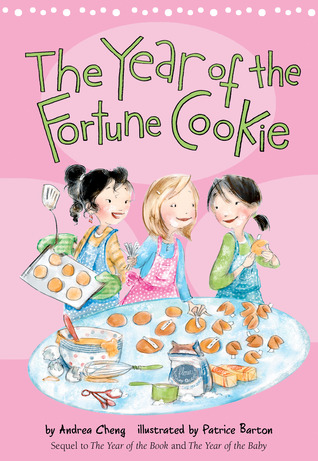 Even more than the last book, this installment of the Anna Wang series has Anna struggling with her identity. As a Chinese-American kid, I would have LOVED to read a book like this that specifically and explicitly explores what it means to be Chinese-American. Plus, this book would be a great way to expose elementary school readers to the idea of diversity, and it may help some non-Asian readers to better understand their Asian-American classmates.
Even more than the last book, this installment of the Anna Wang series has Anna struggling with her identity. As a Chinese-American kid, I would have LOVED to read a book like this that specifically and explicitly explores what it means to be Chinese-American. Plus, this book would be a great way to expose elementary school readers to the idea of diversity, and it may help some non-Asian readers to better understand their Asian-American classmates.
On the other hand, as with The Year of the Baby, I can't help but feel that the diversity lesson is a bit heavy-handed. This is not a book that happens to have a Chinese-American main character who along the way makes self-discoveries; this book IS about a Chinese-American's search for identity, through friendships, activities, language, and travel. I am not opposed to that in theory, but I feel the first book dealt with much broader experiences than just Anna's Chinese-ness, and because the first book of a series usually sets the tone, it's been surprising to find the second and third books of this series focusing on a much narrower experience. They just have a totally different feel than the first book. Maybe I should just disregard the first book and re-align my expectations before picking up the fourth book.
Anyway, I'm also getting tired of the poor editing in this series that results in inaccuracies. Once again, on page 21, Anna's maternal grandmother is referred to as "Nai Nai", even though the Pronunciation Guide at the beginning of the book correctly defines "Nai Nai" as paternal grandmother, and "Wai Po" as maternal grandmother. Then, on page 30, Anna says she will miss 11 days of school from December 12 to 22. Yes, there are 11 days from the 12th to the 22nd, but no matter when the days fall, there is going to be at least one weekend in there, so at most she would miss 9 days of school. I know these are minor details, but it seems like every book in this series so far has at least a couple small errors, and all together, they become distracting.
I also found it hard to believe that Ms. Sylvester would allow Anna to go to Fan's home without any adult supervision at all. Seems like it would have been more believable if Mr. and Mrs. Sylvester went, too, and then it could have been a great experience for them, too, to see what the average family's life is like in China.
Finally, I wasn't entirely able to suspend disbelief in order to accept the premise in the first place - that a teacher would pay for a student's ticket to China when that student's ability to help would be minimal at best. Given Anna's limited knowledge of Chinese, combined with the English-speaking guide hosting a whole group of Americans adopting Chinese babies, it didn't seem to me that she offered any real advantage to the Sylvesters. I think it would have made a fine and more believable story if Anna's mom had gone, too, as originally planned. Like maybe her mom could have spoken to the guide in Chinese in order to convince her to allow the visit to the orphanage, or her mom could have gone with her to Fan's house and the two of them could have shared a bonding moment.


No comments:
Post a Comment